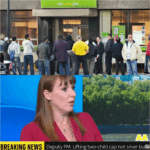For over a decade, Tesla has been synonymous with Elon Musk. The electric vehicle pioneer not only transformed the auto industry with sleek designs and breakthrough battery technology but also served as the primary pillar of Musk’s fortune and influence. However, the tides are shifting. Recent developments in technology, infrastructure, and finance suggest that Tesla, while still an iconic brand and a global powerhouse, may no longer be the most valuable asset in Musk’s vast portfolio. Instead, other ventures—some already public, others still partially veiled in mystery—are beginning to eclipse Tesla in terms of long-term potential, innovation, and economic value

Much of this shift stems from the maturation of Tesla itself. While it continues to deliver cutting-edge vehicles and grow market share across continents, the company is now seen more as an established automaker than a disruptive startup. With competitors catching up and market saturation approaching in key areas, Tesla’s stock has shown signs of stabilizing, if not plateauing. Meanwhile, Elon Musk’s other ventures, particularly SpaceX, are experiencing explosive growth, attracting enormous investment and potentially unlocking entire new industries.
SpaceX, Musk’s privately-held aerospace company, is currently on a trajectory that could redefine humanity’s future. With a valuation surpassing $180 billion, it now rivals Tesla in financial worth. But the value of SpaceX goes far beyond its balance sheet. It is actively launching satellites through its Starlink project, ferrying astronauts to the International Space Station, and making strides toward interplanetary travel. These feats are not just technological marvels—they represent the infrastructure of a new era in communications, defense, and even off-Earth commerce. Starlink alone, a satellite internet service, is projected to generate tens of billions in annual revenue once fully deployed. And unlike Tesla, which operates in a crowded automotive sector, SpaceX is creating markets that previously didn’t exist.
Another key factor contributing to the shift in Musk’s asset hierarchy is AI. Through his new company xAI, Musk is entering one of the most lucrative and contested fields in modern technology. Artificial intelligence has quickly become the backbone of innovation across industries—impacting finance, healthcare, logistics, and even creative arts. By focusing on what he claims will be “truth-seeking AI,” Musk is positioning himself in contrast to existing players like OpenAI, Google DeepMind, and Anthropic. While xAI is still in its early stages, its integration with other Musk platforms like X (formerly Twitter) and Tesla’s self-driving software suggests that it could become a major force, leveraging real-time data on a scale few companies can match.
Speaking of X, Musk’s acquisition and transformation of Twitter into an all-encompassing app has been controversial yet indicative of a broader strategy. He envisions X as a “global town square” and financial platform that will combine social media, content creation, messaging, and banking—akin to China’s WeChat. If successful, X could surpass traditional social media models and become a cornerstone in the next digital ecosystem. And though the platform has faced challenges, its potential for monetization through subscriptions, payments, and AI tools is immense.
There’s also the growing significance of Neuralink and The Boring Company, two smaller but increasingly relevant entities in Musk’s empire. Neuralink is developing brain-computer interface technology, which could revolutionize the treatment of neurological conditions and ultimately merge human cognition with AI. It recently received FDA approval for human trials, marking a major milestone. Meanwhile, The Boring Company aims to solve urban transportation bottlenecks with underground tunnels, and while it may sound less glamorous than rockets or EVs, the need for infrastructure solutions in congested cities is a pressing one.

These ventures reflect a broader theme in Musk’s career: the ability to identify and invest in future-forward technologies before the mainstream catches on. Tesla was once that disruptive idea, but today it shares the stage with companies that could fundamentally alter how humans live, communicate, move, and think. While Tesla builds cars for the present, SpaceX builds highways to the future, and Neuralink imagines futures that barely seem real today.
Moreover, the structure of these companies matters. Tesla, being public, is subject to investor scrutiny, quarterly earnings pressure, and regulatory compliance. SpaceX and xAI, by contrast, are still private, allowing Musk more control and freedom to execute bold strategies without being tethered to short-term market sentiment. This flexibility allows for a level of long-range planning that Tesla can no longer afford without impacting shareholder confidence.
Financially, Musk has also begun to shift how he capitalizes on his businesses. He has sold large portions of his Tesla shares to fund ventures like SpaceX, X, and xAI. While this initially drew criticism, it underscored his priorities and hinted at which ventures he sees as holding greater promise. His personal investment decisions often foreshadow where his attention—and ultimately, innovation—will flow.
That isn’t to say Tesla is declining or irrelevant. On the contrary, it remains the leader in electric vehicle innovation and has set the standard for battery range, autonomous driving, and vertical integration. It will continue to play a crucial role in the transition to clean energy and mass-market electrification. However, it is now just one component in a much larger ecosystem of Musk-led initiatives.
Elon Musk has always been about more than cars. His vision encompasses humanity’s survival, advancement, and evolution. While Tesla helped him fund and build the credibility to pursue those dreams, the ventures now climbing in value and influence reflect a broader, more ambitious blueprint. It’s a testament to Musk’s entrepreneurial adaptability that he’s managed not only to build category-defining companies but also to shift his focus in real time as new opportunities emerge.
As we move deeper into the 2020s, it’s becoming clear that Tesla is no longer the centerpiece of Musk’s vision—it’s a gateway. The most valuable assets in Musk’s portfolio now lie in the sky above us, in the algorithms running silently in the background, and in the uncharted territory of the human brain. Tesla may have been the catalyst for change, but what comes next could redefine what is even considered valuable in the first place.
News
“BANKRUPT BRITAIN?!” – Labour’s Plan to WATER DOWN Its Already Flimsy Welfare Reforms Could HURL the UK Into TOTAL FINANCIAL MELTDOWN
LABOUR is making a complete mess of welfare. Panicked and driven Left-wards by Reform’s surge, the Government is wobbling on the…
“TURKISH HOTEL TERROR!” – Brit Dad Brutally BEATEN TWICE in Front of His Kids… Family Holiday Spirals into a Living Nightmare
The alleged attackers reportedly had a feared reputation A DAD-OF-TWO said he was attacked twice in front of his kids…
“FED to PIRANHAS!” – 31-Year-Old Mum of 3 Vanishes After Ex’s Savage Revenge… Body Still Missing in Brazil
A MAN was caught on CCTV putting his former wife’s body in the boot of a car before coldly dumping…
“Dinner Party of DEATH!” – You Won’t Believe Erin Patterson’s Gross Confession After Her ‘Killer’ Mushroom Meal Claimed 3 Lives
MUSHROOM cook Erin Patterson who is accused of killing three people with a poisoned beef wellington graphically described how she…
HOLIDAY BLOODBATH! Teen SLASHED to Death with Broken Bottle in Lisbon—UK Tourist (27) DRAGGED Back to Portugal in Dramatic Midnight Extradition
Daniel was reportedly attacked while trying to defend a friend A BRITISH tourist has been arrested and extradited to Portugal…
LIVERPOOL PARADE CARNAGE! 53-Year-Old Driver PLOUGHS into Crowd—47 Injured, 4 Kids Hurt—Police Shout “NOT TERROR!” Fans in SHOCK
Emergency crews arrived to find people lying injured in the road and some trapped under the car FOUR children were…
End of content
No more pages to load












